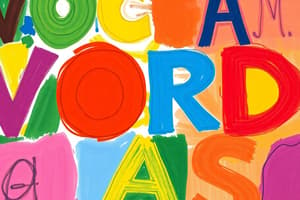Podcast
Questions and Answers
Which type of vocabulary consists of words recognized and understood when reading or listening?
Which type of vocabulary consists of words recognized and understood when reading or listening?
- Creative Vocabulary
- Productive Vocabulary
- Receptive Vocabulary (correct)
- Expressive Vocabulary
What is the primary purpose of developing vocabulary?
What is the primary purpose of developing vocabulary?
- To memorize definitions for tests
- To enhance reading comprehension and communication (correct)
- To create complex sentences
- To learn different languages
What strategy involves using surrounding text to infer the meanings of unfamiliar words?
What strategy involves using surrounding text to infer the meanings of unfamiliar words?
- Reading Widely
- Flashcards
- Word Mapping
- Context Clues (correct)
Which of the following is not a technique for teaching vocabulary?
Which of the following is not a technique for teaching vocabulary?
Which factor does NOT influence vocabulary growth?
Which factor does NOT influence vocabulary growth?
What assessment method involves monitoring vocabulary usage in speaking and writing tasks?
What assessment method involves monitoring vocabulary usage in speaking and writing tasks?
Which of the following is a representative method of direct instruction for vocabulary?
Which of the following is a representative method of direct instruction for vocabulary?
What is an effective way to engage learners in vocabulary development?
What is an effective way to engage learners in vocabulary development?
Which strategy best helps in visually representing a word's meaning, synonyms, antonyms, and usage?
Which strategy best helps in visually representing a word's meaning, synonyms, antonyms, and usage?
Which factor contributes to greater vocabulary acquisition?
Which factor contributes to greater vocabulary acquisition?
Study Notes
Vocabulary Development
Importance of Vocabulary
- Essential for effective communication.
- Enhances reading comprehension and writing skills.
- Influences academic success and overall learning.
Types of Vocabulary
-
Receptive Vocabulary
- Words recognized and understood when reading or listening.
-
Productive Vocabulary
- Words used in speaking and writing.
Strategies for Vocabulary Development
-
Reading Widely
- Exposure to diverse texts increases word knowledge.
-
Context Clues
- Use surrounding text to infer meanings of unfamiliar words.
-
Word Mapping
- Visual representation of a word's meaning, synonyms, antonyms, and usage.
-
Flashcards
- Create cards with new words and definitions for review.
-
Word Games
- Engage in puzzles and games to make learning fun and interactive.
-
Regular Practice
- Incorporate new words into daily conversation and writing.
Techniques for Teaching Vocabulary
-
Direct Instruction
- Teach specific words explicitly with examples.
-
Word of the Day
- Introduce a new word daily to build routine learning.
-
Thematic Units
- Group vocabulary by themes or subjects for deeper understanding.
-
Multisensory Approaches
- Use visual, auditory, and kinesthetic methods to reinforce learning.
Factors Influencing Vocabulary Growth
-
Age and Development
- Vocabulary expands with age, experiences, and education.
-
Language Exposure
- Rich linguistic environments promote greater vocabulary acquisition.
-
Cognitive Skills
- Strong cognitive abilities aid in word learning and retention.
Assessment of Vocabulary Knowledge
-
Quizzes and Tests
- Use standardized assessments to evaluate vocabulary levels.
-
Observational Assessments
- Monitor usage of vocabulary in speaking and writing tasks.
-
Self-Assessment
- Encourage learners to evaluate their own vocabulary knowledge.
Resources for Vocabulary Development
-
Dictionaries and Thesauruses
- Tools for understanding meanings and finding synonyms.
-
Online Platforms
- Websites and apps designed for vocabulary practice and games.
-
Literature and Media
- Exposure through books, movies, and podcasts to encounter new vocabulary.
Importance of Vocabulary
- Critical for effective communication across various contexts.
- Significantly enhances reading comprehension and writing capabilities.
- Directly influences academic achievement and overall learning experiences.
Types of Vocabulary
- Receptive Vocabulary: Encompasses words that individuals recognize and understand when encountered in reading or listening.
- Productive Vocabulary: Involves words actively utilized in speaking and writing tasks.
Strategies for Vocabulary Development
- Reading Widely: Encourages exposure to a variety of texts, leading to an increase in word knowledge.
- Context Clues: Utilizes surrounding text to derive meanings of unfamiliar words, aiding comprehension.
- Word Mapping: Involves creating visual representations that connect words with their meanings, synonyms, antonyms, and contexts.
- Flashcards: An effective tool for reviewing new words and their definitions to reinforce memory.
- Word Games: Incorporates puzzles and interactive games that make vocabulary learning enjoyable.
- Regular Practice: Encourages the integration of newly learned words into everyday conversations and writing activities.
Techniques for Teaching Vocabulary
- Direct Instruction: Involves explicit teaching of specific words along with contextual examples.
- Word of the Day: Introduces a new word each day to cultivate a routine of regular vocabulary learning.
- Thematic Units: Groups vocabulary words by specific themes or subjects to deepen understanding.
- Multisensory Approaches: Engages multiple senses through visual, auditory, and kinesthetic methods to enhance vocabulary retention.
Factors Influencing Vocabulary Growth
- Age and Development: Vocabulary tends to expand as individuals grow older and gain diverse experiences.
- Language Exposure: Environments rich in language contribute to greater vocabulary acquisition and skill development.
- Cognitive Skills: Stronger cognitive abilities facilitate more effective word learning and retention processes.
Assessment of Vocabulary Knowledge
- Quizzes and Tests: Standardized assessments evaluate individuals' vocabulary proficiency.
- Observational Assessments: Monitor vocabulary usage in both speaking and writing to assess practical application.
- Self-Assessment: Encourages learners to reflect on and evaluate their own vocabulary knowledge and progress.
Resources for Vocabulary Development
- Dictionaries and Thesauruses: Fundamental tools for discovering meanings and synonyms of words.
- Online Platforms: Websites and applications designed specifically for vocabulary practice and interactive games.
- Literature and Media: Engaging with books, movies, and podcasts exposes individuals to new vocabulary in various contexts.
Studying That Suits You
Use AI to generate personalized quizzes and flashcards to suit your learning preferences.
Description
Explore essential strategies for vocabulary development that enhance communication, reading comprehension, and writing skills. This quiz covers types of vocabulary, techniques for teaching, and practical methods for expanding your word knowledge. Test your understanding of vocabulary enhancement techniques and their importance in academic success.




